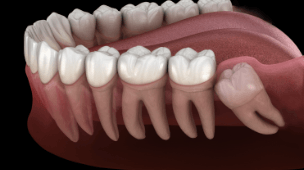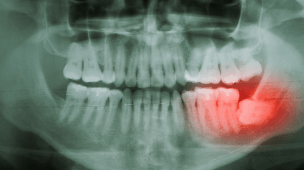Wisdom Tooth Extractions – DuPont, WA
Making Room for a Healthier, Happier Smile

Is your teen dealing with some discomfort in the back corners of their smile? Wisdom teeth are considered the third molars and most often erupt during the mid-late teenage years or early 20s. While not all wisdom teeth pose problems, many young adults often find that they need wisdom tooth extractions in DuPont, WA to create additional space in their mouth and eliminate the potential for future dental problems. If you are looking for the right team to perform this type of procedure, let the team at DuPont Family Dentistry be there for you and your teen. To learn more about how to find out if your child needs an extraction, contact our dental office today!
Why Choose DuPont Family Dentistry for Wisdom Tooth Extractions?
- Straightforward, Stress-Free Extractions
- Gentle, Caring Dentists and Staff
- State-of-the-Art Dental Office
Who Needs Wisdom
Teeth Extracted?

Individuals between the ages of 16 and 22 are often the ones who are most susceptible to receiving wisdom tooth extractions. Why? Because this is when these third molars attempt to make their appearance. Whether they partially erupt or remain impacted, most dentists determine that it is in the best interest of the patient if they are removed. Other reasons we might recommend an extraction is if:
- Infection is present or could be a possibility
- A cyst or tumor is present
- The healthy teeth near the wisdom teeth are damaged
Types of Wisdom Teeth Issues Leading to Extraction

The three most common reasons for wisdom teeth to be extracted are that they are crowded, impacted, or causing sinus complications.
Crowded

If your teen’s wisdom teeth are shifting their healthy teeth in a way that causes overcrowding, it will be necessary to remove them to avoid future orthodontic treatment. Also, if there is already an issue of crowded teeth and their wisdom teeth cannot erupt successfully, this would also be cause for removal.
Impacted

When these third molars do not erupt past the gums and instead remain below the surface, this can create problems for the rest of the mouth as well as cause serious discomfort. Depending on their position and angle, impacted wisdom teeth can push against healthy teeth and cause an infection or a bite alignment issue.
Sinus Complications

For wisdom teeth located in the upper arch, these can become infected and as a result, create complications for your sinus cavity. Your maxillary sinuses sit right above your upper back teeth, making them an ideal target for wisdom teeth to cause problems (i.e., headaches, sinus pain, inflammation).
Post-Operative Care

Because this is a surgical procedure that can be completed one of two ways: simple or complex, your teen will need ample recovery time afterward to ensure a successful and healthy smile. It is during the first few days that a dry socket will be your greatest concern. This is when a blood clot forms but is dislodged due to too much pressure, or it dissolves before the area is fully healed. A dry socket can result in serious discomfort, so to prevent this from happening, try the following tips:
- Do not sip or suck through a straw
- Make sure you are getting plenty of rest
- Avoid chewing as much as possible, especially if you had all your wisdom teeth removed. If only one or two on the same side, avoid chewing on that side of your mouth
- Use a cold compress or ice pack to alleviate discomfort and swelling
- Continue brushing your teeth and flossing, but be careful not to get near the extraction sites
- Take any pain medication or antibiotics as prescribed
- Eat only soft foods in the initial days after surgery
Understanding the Cost of Wisdom Tooth Extractions

The cost of wisdom tooth extractions in DuPont can vary greatly depending on a variety of factors, but rest assured that our team will walk you through a detailed estimate before you consent to moving forward with treatment. We’ll also speak with you about your dental insurance coverage and financing options to help maximize your savings while minimizing any out-of-pocket costs. If at any time you have questions, our helpful team at DuPont Family Dentistry always invites you to ask us!
Factors That Impact the Cost of Wisdom Tooth Extraction

We custom tailor our treatment plans to meet our specific patient’s needs following a detailed oral examination and consultation. Based on our findings, these are some of the factors that could affect the overall price of your treatment:
- How many wisdom teeth you have: Some people are only born with one wisdom tooth, while others have two, three, or four.
- Whether you require sedation: Dental sedation may be required depending on how extensive your treatment needs to be. For impacted wisdom teeth, stronger sedation will be necessary.
- If your wisdom teeth are impacted: Teeth that are impacted either horizontally or vertically will likely require a surgical procedure, which is more extensive and time-consuming than a simple extraction.
- Whether you decide to see a surgeon: In some cases, visiting an oral surgeon may be necessary. However, it’s often less costly to receive a wisdom tooth extraction from a general dentist with surgical training, like our dentists at DuPont Family Dentistry.
Will Dental Insurance Cover Wisdom Tooth Extraction?

In many cases, wisdom tooth extractions are at least partially covered by dental insurance. Our team is happy to file claims on your behalf to make the process as smooth and simple as possible. We also accept most major PPO dental insurance plans, including BlueCross BlueShield, Delta Dental, Aetna, and Cigna. If you have any questions about your coverage, don’t hesitate to ask us!
Making Wisdom Tooth Extraction More Affordable

For our patients who are uninsured or underinsured and aren’t able to pay the entire out-of-pocket cost up-front, we also offer financing through CareCredit. Upon approval, you’ll be able to split the price of your procedure up into smaller, manageable monthly payments at little-to-no interest. This offers our patients a more flexible, accommodating way to make sure their dental healthcare needs are met.
Wisdom Tooth Extraction FAQs
Why are wisdom teeth called that?
Third molars are called “wisdom teeth” because they do not erupt until a person is more mature in age. Typically, the average person receives wisdom teeth between the ages of 17 and 25. While this may not seem like an age range that qualifies as “wise” according to today’s standards, the simple explanation is that throughout the ages, the saying “with age comes wisdom” remains true. Since all other teeth are in place before these emerge, it is understandable why they might be considered “wise” based on their appearance “later in life.”
Is wisdom tooth removal painful?
We will numb your mouth with local anesthesia before beginning the removal process. This will help you to feel no pain throughout the procedure. Sedation is also often used to make you feel more at ease. As a result, it is unlikely that you will feel any discomfort while having your wisdom teeth removed. However, once the anesthesia wears off, you will likely feel some discomfort in the days following. This is why detailed aftercare instructions are provided. Within a week, though, you should begin to feel normal.
What is the best age to get wisdom teeth removed?
Although they appear between the ages of 17 and 25, there is no official age that declares these teeth must be removed. However, most dentists recommend early adulthood for extraction because of the easier recovery and removal process. The older you are, the roots of your wisdom teeth will grow more embedded into the jaw. As a result, the procedure can become more complicated and require a longer recovery time to heal properly.
How long does wisdom tooth surgery take?
Because of the sedation provided by your dentist in DuPont, you will likely feel as if your surgery goes quickly. The average amount of time for each extraction, however, is between 15-20 minutes. Altogether, the process can take up to 90 minutes to complete, but it varies depending on the location of the tooth, its position, and if it is impacted. You will need to have someone escort you home, so the dentist will make sure the person is aware of how long it is expected to take for surgery.
Does everyone have wisdom teeth?
You may be surprised to learn that not everyone has wisdom teeth. Some people may have all four of their third molars, while others can have three, two, one, or none. Researchers predict that genetics plays a role in how many wisdom teeth you have. For example, if one of your parents doesn’t have all of their wisdom teeth, it’s likely that you will be missing one or more of them. An estimated five to 37 percent of people are missing one or more of their wisdom teeth!
How can I make my wisdom tooth pain go away?
It’s not uncommon for wisdom teeth in DuPont to cause pain. In fact, that’s a common reason why dentists recommend having them extracted! While this is the only permanent way to solve the discomfort in many cases, here are a few tips to help ease your pain until your procedure:
- Place a cold compress on your face for 10 minutes on, 10 minutes off for up to an hour. This will help numb the area and ease your discomfort. It can also reduce any swelling. Be sure to wrap the ice pack or cold compress so it doesn’t press directly against your skin.
- Take over-the-counter pain medication like ibuprofen as directed.
- You can also try using an over-the-counter oral numbing gel to soothe irritation and pain.
- Rinse your mouth with saltwater throughout the day, being sure to spit it out and not swallow it.
Do wisdom teeth always need to be removed?
It’s not always the case that wisdom teeth need to be extracted. In fact, it’s usually recommended as a preventive measure if a patient is at a high risk of complications occurring if they allow their wisdom teeth to grow in. Typically, we recommend extraction if they’re causing you pain, they put you at a high risk of infection, they cause a cyst or tumor to develop, or there’s not enough room in your mouth to accommodate them.
How long does it take to recover from a wisdom tooth extraction?
Your recovery period will really depend on your specific case. For example, a surgical extraction due to impaction will likely require a longer healing time than a simple extraction. However, on average, patients typically feel much better by the third or fourth day following their treatment. After about a week, you should be able to get back on with your daily life.
